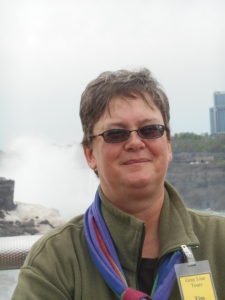Authored by Regina Ferrera, M.S.W.
“From Family to Society: The Broad Scope of Bowen Systems Thinking” was the subject of the Center for Family Consultation Summer Conference held in Oak Park on July 20, 2018. Dr. Katharine Gratwick Baker, a scholar of Bowen Family Systems Theory and historian, was the presenter. Dr. Baker has a PhD in Social Work and an MA in Russian History.
Dr. Baker began the day by tracing a thread in her own family history of past and present family members who have been and are currently social activists. She has been influenced by them to think about how societies function and her own role as a member of society.
The presenter described how her interest in Russia had developed from childhood and eventually led to her going to Russia numerous times to teach. She was invited to teach Bowen theory to Russian psychologists. Her connections with Russian people and organizations later enabled her to do a research study.
The study was an application of Bowen theory to an aspect of Russian/Soviet history. The study looked at the grandchildren of the victims of Stalin’s purge in the 1930’s in terms of emotional cutoff. Fifty people were interviewed in depth and the results were analyzed. The results showed that although all of the families had been affected by the purge, they had not been affected to the same degree. There was a range of functioning among the grandchildren that had to do with levels of cutoff between the generations. Dr. Baker co-authored an article (1) about the study that is listed at the end of this post.
Another highlight of the day was a discussion of Olga Adamova-Sliozberg, a victim of Stalin’s purge who wrote a memoir (2) about her almost twenty years of imprisonment in various prison camps, including in Siberia. Dr. Baker read from the memoir, which she had translated from Russian to English. Ms. Adamova-Sliozberg wrote movingly of her experiences of deprivation and suffering. She also wrote of her ability to engage in relationships with other prisoners and her strong desire to see her family again. The author had a purpose and a sense of self, even in the most soul-destroying situation. Her high level of differentiation of self appeared to be a key factor in her surviving a long and brutal imprisonment.
Dr. Baker illustrated the continuity between emotional triangles in the family and in the society with a compelling example: the triangle relationship between key players in the Russian revolution: Lenin, Trotsky, and Stalin. From biographies, she was able to trace each of their positions in their families of origin, and then to show how this subsequently played out in the relationship triangles involved in the struggle for leadership in the Russian revolution. (3)
CFC faculty member, Stephanie Ferrera, interviewed Dr. Baker on the question of how societies change, and what it takes to bring about change without violence. With examples provided from audience members, we saw that leadership at a high level of differentiation is key in societies that have achieved peaceful change. Another point stressed by the presenter is that societies make progressive change even at times of regression. (4)
The final subject for the day was “Living Bowen theory in the community.” Dr. Baker described her current work in creating and developing a virtual village in which people over fifty-five years old can get connected to volunteers who are willing to help them with basic needs. The goals are to help older members of the community stay in their own homes as long as possible and to foster connections between people of all ages in the community.
All of the topics presented had to do with the interface between families and society. The emotional triangles and intergenerational cutoff that occur in families play out on a societal level. The application of Bowen theory to aspects of Russian history gives one a different way to understand that history by describing the relationship processes that drive historical figures and social groups.
I found the conference to be fascinating and inspiring, a great opportunity to focus on Dr. Murray Bowen’s concept of societal emotional process. Dr. Baker did a wonderful job of integrating her own very interesting family and life experiences with the topic of the day. She breathed life into the theory. I left the conference feeling inspired to keep studying and applying the concept of societal emotional process and to keep reflecting upon my own role in my family and society.

- Baker, Katharine Gratwick and Julia Gippenreiter. 1996. “The Effects of Stalin’s Purge on Three Generations of Russian Families.” Family Systems 3(1): 5-35
- Adamova-Sliozberg, Olga. 2011. My Journey: How One Woman Survived Stalin’s Gulag. Northwestern University Press. Translated from Russian to English by Katharine Gratwick Baker.
- Baker, Katharine Gratwick. 2008. “Triangles in Societal Emotional Process with an Example from the Russian Revolution.” In Triangles: Bowen Family Systems Perspectives. Peter Titleman, ed. New York; The Haworth Press.
- Baker, Katharine Gratwick. 2017. “Emotional Process In Society: A Review and Expansion of the Concept.” Family Systems 13(1): 9-34



Leave a Reply